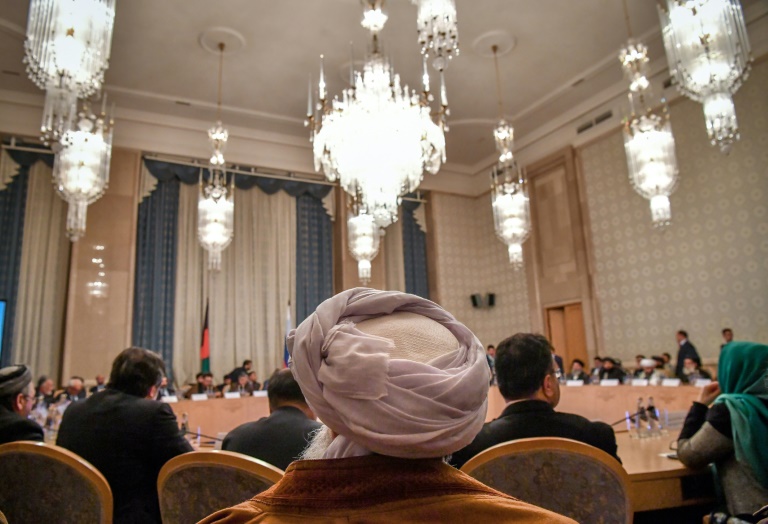
The Taliban entered a second day of unprecedented talks Wednesday with powerful Afghan politicians in Moscow, sidestepping the Kabul government as they pursue a leading stake in the war-torn country.
The rare public appearance saw Taliban officials spelling out their vision for Afghanistan in front of rolling cameras and a host of political heavyweights, including former president Hamid Karzai.
The insurgents sidestepped President Ashraf Ghani, sitting down instead with his chief rivals at an extraordinary meeting which saw Karzai and other sworn enemies of the Taliban praying with the militants.
No government official was invited, despite Ghani offering to talk peace, underscoring the Taliban's hostility toward the increasingly-marginalised Kabul administration.
The Moscow meeting took place a week after the Taliban held separate talks aimed at ending 17 years of fighting with American negotiators in Doha, where Ghani was also not invited to the table.
US President Donald Trump on Tuesday described those talks as "constructive" and voiced cautious hope for a negotiated end to America's longest war.
US talks in Doha
On Wednesday, the Taliban claimed that Washington had agreed at the Doha talks to withdraw half of the US ground troops by the end of April -- saying the process had already begun.
"The Americans agreed to withdraw half of their troops immediately," Abdul Salam Hanefi, deputy head of the Taliban's political office in Doha, told reporters in Moscow, saying the pullout had already started.
But a spokeswoman from the US Embassy in Kabul, denied any such agreement was made.
"We have not agreed to any timeline for a possible drawdown of troops and are not going to get into any other specific details of diplomatic conversations," she told AFP.
"The US does not seek a permanent military presence in Afghanistan. If all parties do what is necessary to prevent Afghanistan from being used as a platform for terrorism, as conditions allow we are willing to look at changes in force presence."
- Kabul's involvement crucial -
Ghani's allies in Washington insist Afghans should lead the peace process, and ostensibly the months-long push by the US to engage the Taliban has been aimed at convincing them to negotiate with Kabul.
A top US general said Kabul must be involved in talks if the push for a peace deal is to be successful.
"Ultimately, we need to get to a Taliban-Afghanistan discussion," General Joseph Votel, head of US Central Command, told US lawmakers.
"Only they will be able to resolve the key issues involved in the dispute."
Ghani said he had spoken late on Tuesday with US Secretary of State Mike Pompeo who had stressed the importance of "ensuring the centrality of the Afghan government in the peace process".
The Afghan president has vented frustration at being sidelined as as his political enemies shared prayers and meals with the Taliban while discussing the future of his country.
'Nothing more than fantasy'
"The Moscow meeting is nothing more than a fantasy. No one can decide without the consent of the Afghan people," Ghani told Afghan broadcaster TOLOnews.
"Those who have gathered in Moscow have no executive authority. They can say what they want, but who are they representing?"
The Moscow conference is the Taliban's most significant engagement with Afghan leaders in recent memory.
Mohammad Haneef Atmar, one of Ghani's main rivals in the upcoming presidential election scheduled for July, described the talks as "very positive" saying there was "much less dissent than what unites" those present.
"Undoubtedly the Taliban have their position (and) the other sides have their position. It will all be a subject of discussion."
The conference is also unique because the Taliban -- who banned television, cinemas and photography when they ruled Afghanistan between 1996 and 2001 -- are rarely so visible.
Their leadership is seldom seen in public and scenes of Taliban officials, some wearing black turbans with long beards, outlining their manifesto for live television is virtually unheard of.
Speaking to the Afghan envoys -- some of whom are female -- the Taliban promised to loosen some restrictions on women and not seek a monopoly on power.
They have proposed an "inclusive Islamic system" of governance but demanded a new Islam-based constitution for Afghanistan.


